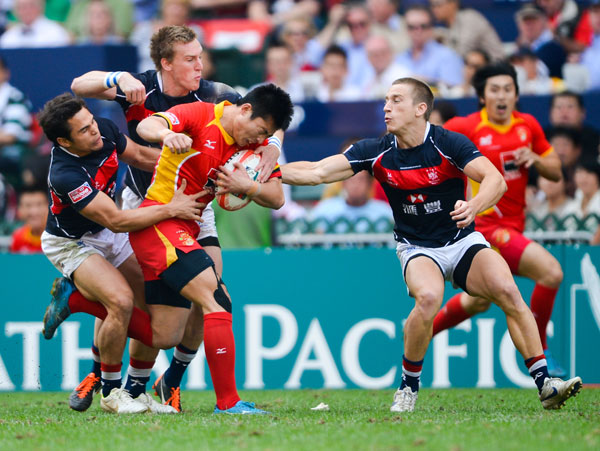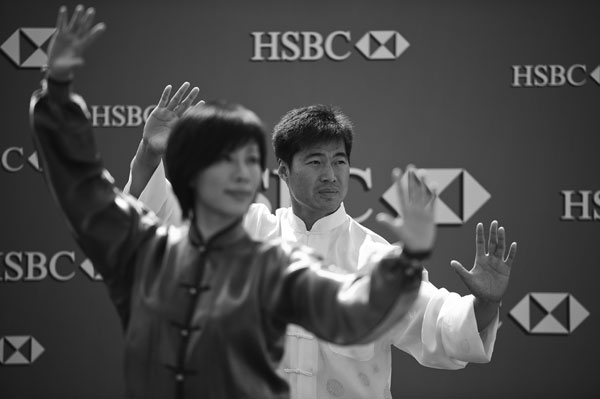Still a long road for rugby
Updated: 2013-02-22 09:25
By Tang Zhe (China Daily)
|
|||||||||||
 |
|
Team China plays against team Hong Kong at the 2012 Cathy Pacific/HSBC Hong Kong Sevens last March. The Chinese men's team failed to make the top three at the HSBC Asian Sevens Series last year, which means it will miss the event this year. China is trying to turn its program around in time for the sport's Olympic debut. [Provided to China Daily] |
 |
|
Zhang Zhiqiang, right, is charged with leading China's Rugby Sevens squad as the sport's Olympic debut looms in 2016. [Provided to China Daily] |
Inclusion of sport at 2016 Games sparking interest here - slowly
As an icon of Chinese rugby, Zhang "Johnny" Zhiqiang was delighted to see the game's return to the Olympic family and the corresponding rise in its profile here.
After its inclusion at the 2016 Olympics was announced in 2009, the sport was listed as a formal event at the National Games of China, and will therefore receive far more attention from regional sports authorities in an effort to chase medals in the quadrennial national event.
According to Zhang, who took up the coaching role of the men's national team in 2010, there are 12 provinces working on the sport's development in China, with 12 men's teams and 11 women's teams. Six of each will participate in the National Games in August after qualification rounds.
Shandong, Anhui and Jiangsu provinces are pioneers in the field and have taken teams to powerhouse Rugby Sevens nations Fiji and New Zealand for training while also popularizing the sport in middle schools.
Shandong has more than 20 schools in its rugby program, Jiangsu has launched a provincial school tournament and Anhui, with more than 30 teams, has organized its own league.
However, the game's burgeoning prosperity across the nation has not translated to national squad success. The men's team failed to make the top three in the HSBC Asian Sevens Series last year, which means it will miss the Cathay Pacific/HSBC Hong Kong Sevens - the national team's most important annual event since it first attended the tournament in 1998.
The men's team also missed out on qualifying for the most recent Rugby World Cup Sevens in Moscow in June.
The biggest problems for the national team are a limited talent pool and a tight training budget, Zhang told China Daily in Beijing.
"Rugby in China only has a history of about two decades. Compared with other countries that have developed the sport for more than 100 years, Chinese rugby is still in its infancy stage," Zhang said.
According to Zhang, China has 2,000 registered players, while England has more than 700,000.
"The choice is very limited for the national teams due to the tiny rugby population," he said. "Almost all the rugby players used to be in athletics and basketball and transferred to rugby after failing to stand out in their former sports.
"Our players start rugby at 18, 19, and have to devote almost all of their time to basic skill training," said the 38-year-old. "Their foreign counterparts form that knowledge in childhood and are doing strength training eight hours a day between 19 and 22 years old - the prime period to boost the body."
The Chinese team now has two players, Li Yang and He Zhongliang, playing in the Japanese league, but few others are competitive enough to play abroad.
"I got the chance to play overseas in my 20s, and playing with strong opponents and that atmosphere enabled me to find out my weaknesses; it also motivated me to learn, practice and make changes to my game," said Zhang, who played in Britain with the Leicester Tigers.
"That helped me prolong my career."
As far as financial support is concerned, Zhang said the national team is only allocated 600,000 yuan ($95,000) for travel every year, which means fewer overseas assignments.
Besides the Cathay Pacific/HSBC Hong Kong Sevens, the team only plays HSBC Asian Sevens Series games abroad and the traveling costs for those events are covered by the organizers.
"Due to capital constraints, we have little money to play and communicate with the strong teams abroad, which is a major obstacle for a sport's development," Zhang said. "Rugby is a foreign product, therefore going out is the most productive way to improve the team's play and broaden the players' experience."
tangzhe@chinadaily.com.cn
Related Stories
China ready to host more rugby events 2012-10-22 07:58
Schools to give rugby a try, amid protest 2012-06-05 02:23
Parents tackle school chiefs over rugby plan 2012-06-04 12:20
Mixed fortune for China at HK Rugby Sevens 2012-03-24 20:01
Chinese struggle on opening day at HK Rugby Sevens 2012-03-24 18:22
China's rugby on a roll 2012-03-04 07:53
Today's Top News
Police continue manhunt for 2nd bombing suspect
H7N9 flu transmission studied
8% growth predicted for Q2
Nuke reactor gets foreign contract
First couple on Time's list of most influential
'Green' awareness levels drop in Beijing
Palace Museum spruces up
Trading channels 'need to broaden'
Hot Topics
Lunar probe , China growth forecasts, Emission rules get tougher, China seen through 'colored lens', International board,
Editor's Picks

|

|

|

|

|

|





